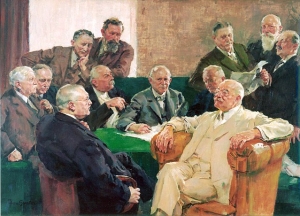Corporate governance is a complex idea that is often inappropriately simplified as a cookbook of recommended measures to improve financial performance. Many studies suggest that the supposed benign effects of these measures —independent directors or highly incentivised executives— are at best context specific. Corporate Governance in Contention explores and explains the meaning, purpose, and importance of corporate governance, with discussions centring on relationships within or specific to the firm, e.g. between labour, managers, and investors, and more general relationships that affect consumers or the environment. Many of the chapters examine alternatives to the shareholder value perspective and propose forms of stakeholding that can improve the work environment while encouraging investment, innovation and sustainable growth. The role of labour in corporate decision-making is the topic of Bob Hancké’s third post in this series.
What if workers were closely involved in corporate decision-making? Most of the time that question is raised in terms of ‘economic’ or ‘industrial democracy’. Labour contributes to the economy and should therefore also have a say in how the economy is run, from the top (in government, through national pay negotiations, or in consultations over legislation and regulations) to the shop floor (funnelling concerns by workers, policing health and safety, and playing a part in training and skill formation). From this point of view, including labour’s voice is simply a matter of social justice. But including worker representatives in strategic decision-making can actually improve corporate performance.
Should labour be involved?
What, then, can labour contribute to the quality of corporate governance? For a long time the conventional view, cogently expressed by Milton Friedman, has been that any restrictive influences on management autonomy will, all other things equal, result in lower corporate performance. However, the relatively strong economic performance of both large export companies and economies as a whole in northwestern Europe in the recent past has raised the possibility that instead of an obstacle to improved company performance, the inclusion of labour in formal and informal decision-making may well constitute a competitive asset. If this were the case, how would that work?

The standard way to think of the issue of corporate governance is to see it as an information problem. Professional management, hired for its expertise, also has access to wider and deeper information than the owners of the company, and may therefore pursue strategies that are not necessarily in the best interests of the owners. The standard solution to this agency problem is to align the incentives of management and owners. Performance bonuses or stock options, for example, assure that corporate targets are met or that the share price rises. Yet these alignment strategies often imply that short-term considerations prevail in corporate decision-making, and that many negative externalities are ignored. It is not hard to imagine how a short-term increase in the share price can come at the expense of long-term sustainability: the financial crisis that started in 2007 gave us a sense of the havoc that short-termism can wreak. And local economies usually suffer when a company restructures, even if the company becomes more profitable afterwards – an effect that is not reflected particularly well in the share price. Aligning the incentives that management faces thus gets you, at best, only partly to the point where you want to be.
Read also: Part II – The Performance of Foundation-Owned Firms by Steen Thomsen
What does labour have to offer?

There may be another way around the problem, which starts from a somewhat unusual perspective. Representatives of labour and capital bring very different, often highly complementary information sets to corporate decision-making. Owners have, on the whole, a very decent knowledge of how the company is doing in areas such as strategy, technology and markets by virtue of their privileged position as market observers. Yet frequently they have only limited knowledge of the internal operations of the company and have to rely on top management’s word for that. Representatives of employees face the opposite problem: they are relatively agnostic about these ‘external’ areas that the capital side on the board understands more easily, but have an informational advantage in areas related to assets and problems inside the company, especially organizational processes, human resources policies and labour politics. In such a setup, where both representatives of capital and labour have a meaningful voice in corporate governance, management cannot exploit any informational advantages that it may have over either owners or employees. Corporate governance is therefore more likely to balance profits and other claims on the company, manage short-term as well as long-term strategies and reduce negative externalities as a result.
There’s a decent chance that we are looking into the future when we examine parity-based governance systems. If robots indeed become smarter, then skills and capital will increasingly be co-specific – neither labour nor capital will be able to realise its potential without the active cooperation of the other. Under such a new technological regime, joint decision-making involving labour and capital is a powerful mechanism to elicit ex ante commitment from both, while assuring a fair ex post distribution of the surplus generated (and thus foster future cooperation). And while doing the right thing, companies will be better run. Perhaps there is such a thing as a free lunch after all?
Bob Hancké is Associate Professor of Political Economy at the London School of Economics.



Worker representation is rightly seen by Bob as a mechanism for creating bottom-up information flows that could improve efficiency and well-being. There is an interesting question as to whether this should be seen as constraining management. In such a view, short-termism and self-serving behavior originates from executive management, as in the traditional principal-agent model. There is, however, another perspective in which management has become complicit with owners in favouring short-termism. In either case worker representation would be a valuable counter-weight, but for somewhat different reasons.